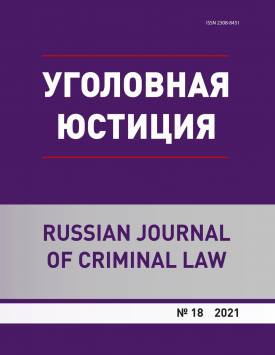Social Connections of Persons Sentenced to the Deprivation of Freedom as a Factor of Their Differentiation
Restrictions on contacts of convicts with the outside world have a negative effect on their correction, which, given the goals of the penitentiary system, seems paradoxical. For this reason, the differentiation of the types of correctional institutions and the conditions for serving sentences by the number of visits is clearly outdated. International standards presume any social contact with the outside world (family, friends, partner, people outside the prison) to be positive. Social ties can be divided into close relative and other. Accordingly, the item on serving a sentence in the place of residence before conviction should first of all apply to those who have family ties in this region. When determining the place of serving a sentence in another constituent entity of the Russian Federation in relation to convicts who do not have family and/or friendly ties, it is necessary to take into account the possibility of their employment, training, and obtaining a profession. In the context of convicts' desocialization in prisons, it seems important to develop their social communication skills, which will contribute to their active resocialization after release from prisons.
Keywords
socially useful connections, differentiation of persons sentenced to deprivation of freedom, socialization of prisonersAuthors
| Name | Organization | |
| Savushkin Sergey M. | Tomsk Institute for Advanced Training of Employees of the Federal Penitentiary Service of Russia | crim.just@mail.ru |
References

Social Connections of Persons Sentenced to the Deprivation of Freedom as a Factor of Their Differentiation | Ugolovnaya yustitsiya – Russian Journal of Criminal Law. 2021. № 18. DOI: 10.17223/23088451/18/15
